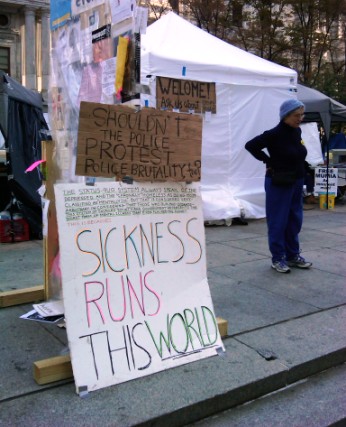Watching the various Occupy protests around the country caused me to take another look at my Honesty and Trust report from 2006. I found this conclusion from Jamie O’Boyle of The Center for Cultural Studies and Analysis:

“Most Americans have moved beyond thinking of violations of honesty and trust as the problem of a few ‘rotten apples,’ but instead view our major institutions as a ‘rotten barrel’ problem… [and] …feel that core values are being threatened by the very institutions and leadership that are supposed to serve and reinforce them….
“Americans are notoriously slow to anger,” the Centerconcluded, “but this survey reflects a deep anger and suspicion that portends the current standards of corporate behavior will not remain unchallenged much longer.”
And guess what we got?
Occupy Wall Street has spread across the country – from New York to Chicago, Atlanta, Phoenix, Oakland, Los Angeles, Philadelphia, Boston and more. Individuals from all ages, backgrounds and political dispositions have come together with countless grievances and one common denominator: WE’RE FED UP!
“Peace activists, indigenous rights activists, immigrant activists – they’re all here,” says Liz Hourican, a protestor in Phoenix. “It may sound different to you, but it’s all the same. We’re all stepping up and saying something’s wrong.”
A conversation with the Center’s Jamie O’Boyle led to his reporting on the Occupy movement in Philadelphia.
“Why did it take so long for people to take action?,” O’Boyle says. “It didn’t. We elected Obama, the candidate who gave us a vision of sweeping change. It is only now when many of his supporters are disillusioned with the pace of progress that theOccupy movement took hold.
“The Tea Party is another instance of people rising up in frustration with the status quo. They did it sooner because they didn’t have faith in Obama to begin with, it may have been promoted by Fox News, but the frustration was real.
“What both movements have in common is the lack of a charismatic leader with a viable plan. The Republicans are jockeying for position, and the Occupy movement is consciously trying to do without one, but the amorphousness of the frustration makes it difficult for one to arise at this point.
“The other common theme is that both movements are expressions of, in Rick Perry’s term, ‘Being fed up with being fed up.’ ”
“Will the Occupy movement turn into something?
“Not in its present form, but it has provided some focus. Unlike the Hoovervilles of the Great Depression, it’s a sea of $200 -$300 REI camping tents in Philadelphia. The group is mostly perceived as college-educated liberals. Many of them are opposed to the idea of capitalism itself, while most Americans want to move up the socio-economic ladder. They don’t have a problem with the system itself, but with what they perceive as massive institutional abuses of the system. By trying to respect all points of view, they are devaluing their own brand.
“In Chicago people identifying themselves as Occupiers joined an anti-Israel march, which lost them many otherwise natural allies in middle and working-class Jewish supporters. In Philadelphia they marched in an anti-Columbus Day protest, losing similar support among the sizable South Philadelphia blue-collar Italian community. In the U.S., Social Change Movements only succeed when the middle-class join in strength, and both the Occupy movement and the Tea Party are turning them off.
“So what’s in their future?
“A hard winter, but in the Spring of an election year theOccupy movement could become a seedbed for a more mainstream movement. Union leaders have dropped by, so have some politicians, but they clearly have decided that the time is not right to associate with such a fractured group. If they move in strength in the Spring they have the organizing power to turn it into a viable third force in an election year.”
In my 2006 survey the final question asked: What 2 or 3 specific changes would have to take place in order to improve honesty and trust in America? Many of the top responses continue to ring true today:
“We need more statesmen as leaders.”
“We need to make sure that everyone is accountable for their actions — whether an assembly-line worker or… CEO.”
“We need to stop applauding money and start applauding ethics.”
“We need a media that… actually does some investigation into important issues not trivial ones.”
“We need less media pundits… [that] do nothing but spread hatred in order to make themselves more popular.”
“We need some new heroes… like parents, teachers, [and] community activists.”
“We need to hold up people of character as role models.”
“We need to remind each other that we are all Americans. That we’re not Republicans or Democrats, Liberal or Conservative, Left or Right.”
“We need leadership that places a high value on honesty, even when they have to pay a high price for it…”
“…But, it will take special people with great courage and influence, as well as time.”
So, how will the Occupy movement shake out?
“If they don’t alienate the middle-class,” O’Boyle concludes, “they have a lot of good will. In marketing, there is a concept of the predisposition to buy. Coke has it. You don’t have to sell the idea of Coke; you just have to get the product in front of the people with the predisposition to buy. People have a predisposition to buy into the Occupy movement concept, but so far they have no product.”
The upside of anger is the positive change we bring about and the people we become. Will the Occupy movement be the catalyst that brings about that positive change?
Stay tuned…
Comments










